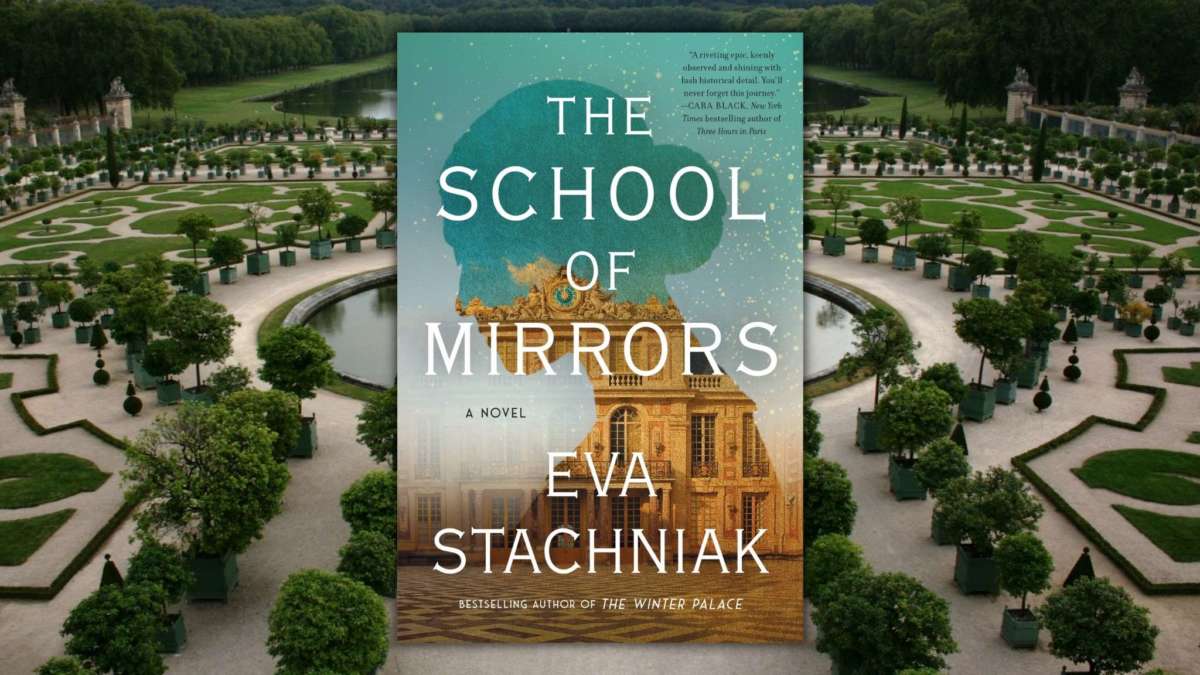The School of Mirrors by Eva Stachniak
Veronique’s life is not easy. It’s Paris, 1755. Her father is dead, her mother is desperately poor, and the family’s four children sometimes go hungry. But one day that all changes. An elderly stranger wearing a purple frock coat approaches Veronique’s mother and says there is a place for the 13-year-old as a maid in the splendid household of a rich Polish nobleman. The mother agrees, and Veronique is whisked away to a villa in the town of Versailles called Deer Park.
It may sound a bit like a fairy tale so far, but the tale is about to head in a very dark direction. After several weeks go by, the middle-aged “Polish nobleman” has sex with the frightened Veronique, as he has with other girls working as “maids” in the house. And he’s no Polish nobleman. He’s Louis XV, King of France, and considered by some the most important man in the Western world at the time.
This is the story depicted in the historical novel The School of Mirrors (William Morrow), written by award-winning Polish-Canadian author Eva Stachniak — and it’s a story based closely on historical record. Stachniak researched the infamous Deer Park that the French monarch used to house the teenage girls procured and groomed for his affairs. The stranger who approached Veronique’s mother that day was Dominique Lebel, the king’s valet-de-chambre. Aiding Lebel in his management of Deer Park was the king’s sophisticated official mistress, Madame de Pompadour. These were the crumbling days of the ancien regime, with a debauched King Louis in a moment of prescience supposedly saying, “Après moi, le deluge.”
FROM RUSSIA’S WINTER PALACE TO FRANCE’S VERSAILLES
Stachniak is the author of The Winter Palace, a novel of Catherine the Great that became a Canadian and international bestseller. She followed it with Empress of the Night, also following Catherine, and The Chosen Maiden, about Bronia and Vaslav Nijinsky.
Stachniak says, “Working on The Winter Palace, I often thought how Catherine the Great was vilified for taking young lovers. She was sixty when her last favourite, Platon Zubov, was 20, and this caused a wide-spread condemnation all over Europe. Then, much later, I found The Private Memoirs of Madame du Hausset, Lady’s Maid to Madame de Pompadour, a gossipy account of the court life under Louis XV. This is where I learned of the existence of Deer Park, the house where royal courtiers groomed teenage lovers for Louis XV. There you are, I thought! I got you!”
One of the most interesting things about The School of Mirrors is that the story of Veronique is only half the plot. The second protagonist is the daughter that Veronique, discarded royal plaything, is forced to give up, Marie-Louise, who never knew either of her real parents and must chart a course through a violent revolution.
Stachniak spent more than four years researching and writing The School of Mirrors, traveling to France and poring through records. “Apart from the Memoirs of Madame du Hausset, I found the police reports extremely useful. For decades, an army of French informants recorded private conversations, copied letters, commented on the ‘state of the nation’s mind’ for the use of the King and later the Revolutionary Government.”
As she worked on the novel, she contemplated the sexual tastes of Louis XV, grandfather of Louis XVI who was guillotined during the French Revolution. She said, “These Deer Park girls were just icing on the cake. He had many other lovers … Though I do think he truly wanted to be desired and loved for himself, not for being king. It thrilled him to pretend to be some ‘lowly’ Polish count, a second cousin to the queen, to have these smitten young women at his feet.”
18TH-CENTURY WOMEN AND THE PROMINENCE OF MIDWIFERY
Stachniak said she is drawn to the 18th century by its women. “Bolder, more independent than their Victorian daughters and granddaughters,” she explains. “Closer to us in their mindset.”
Pre-Revolutionary France has some surprising aspects to it, such as the prominence of French midwives. “Trained, professional, valued and well compensated for their skills,” she said. “Among them the marvelous Angelique du Coudray who travelled all over France with her own midwifery course, teaching generations of young peasant women the art of midwifery. She invented an obstetrical mannequin, the ‘machine’ which she used to give her students an opportunity to practice different forms of birth. And Louis XV, to his credit, gave her the title of the King’s Midwife and financed her mission!”
In The School of Mirrors, Stachniak captures well the whispers and rumbles — followed by the thunder — of revolution. She herself came to Canada in 1981 to study at McGill University and stayed in Canada after the imposition of martial law in Poland prevented her from returning home.
“Emigration and immigration have marked me deeply,” she said. “I’m drawn to characters who change nationalities, countries, identities: Catherine the Great, Bronislava Nijinska. My Polish childhood made me aware of the impact of big history on our daily lives.”
“This is what I search for in my characters … ways in which history affects them.”
About Eva Stachniak:
Eva Stachniak is an award-winning and internationally bestselling author of six novels, including The Winter Palace, Empress of the Night, and The Chosen Maiden. She holds a Ph.D. in literature from McGill University. Born and raised in Poland, she moved to Canada in 1981 and lives in Toronto.






